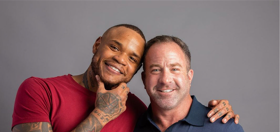 Today the justices of the Supreme Court are expected to decide whether or not they will hear one of several cases involving marriage equality that have landed on their doorstep.
Today the justices of the Supreme Court are expected to decide whether or not they will hear one of several cases involving marriage equality that have landed on their doorstep.
Though they may make the call today, the Supremes’ decision isn’t expected to be announced until Monday or possibly later.
Of course, that doesn’t mean we can’t game the odds before then.
Many are banking on the justices addressing Proposition 8 in an appeal of Perry v. Brown (now known as Hollingsworth v. Perry). It’s become a banner cause for the LGBT community and a lighting rod in the struggle for equality. But even David Boies and Ted Olson, who litigated Perry v. Brown, don’t want SCOTUS to take up the case.
How about we take this to the next level?
Our newsletter is like a refreshing cocktail (or mocktail) of LGBTQ+ entertainment and pop culture, served up with a side of eye-candy.
If the judges pass on it, the 9th Circuit ruling stands and Prop 8 falls into history’s dustbin. But if they take the case and rule in favor of Prop 8 supporters, we’re screwed.
Sure, we’d miss out on an important symbolic victory if the justices turned down a Prop 8 appeal, but thousands of gay and lesbian couples in California could finally be legally wed.
Then there are the cases addressing aspects of the Defense of Marriage Act, which supersedes any given state’s marriage-equality laws. You might be legally wed in Iowa, but good luck filing your federal taxes jointly.
There’s good reason for the Supremes to take up DOMA, not the least of which is if they rule it’s unconstitutional, Prop 8 would be be too, anyway.
Some of the cases before the court, like Golinski v. Office of Personnel Management, Pedersen v. Office of Personnel Management, and Gill v. Office of Personnel Management, address the inequity facing LGBT government employees who are legally married in their home states but can’t receive partner benefits from the federal government.
Windsor v. the United States, on the other hand, focuses on 83-year-old widow Edie Windsor, who had to shell out more than $300,000 in estate taxes when her wife died. She wouldn’t have had to face that burden if they were husband and wife—even though they tied the knot in marriage-equality New York.
Its not difficult to divine which path President Obama wants the Supreme Court to take: He’s stopped defending DOMA in court but, though he personally supports marriage equality, he maintains its a state’s right to decide. And the Solicitor General’s office has asked the court to hear this case if the Court does not take the Gill, Golinski, or Pedersen cases.
Letting people who live in marriage-equality states get what’s coming to them seems like an easier road to travel than wrestling with “the will of the people” of California. But you never know what’s going on in the minds of the Nine.
Which hand do you think the court will play?


















John Doe
Well, we won’t hear anything today. Maybe on Monday – or later. Not entirely untypical. See below.
http://www.scotusblog.com/2012/11/no-action-on-same-sex-marriage/#more-155843
“The Supreme Court, after taking most of the day to prepare new orders, took no action Friday on the ten same-sex marriage pleas now on the docket. ”
“The next opportunity for the Court to issue orders will be at 9:30 a.m. Monday. Nothing has ruled out the possibility that some actions on same-sex marriage could be announced at that time, although….” (See link for rest)
—-
I think that SCOTUS will pick one case on the state level…. and one case on the federal (DOMA) level. This addresses same-sex marriage from two different angles.
Dumdum
Who cares? They got their jobs and money. If you think those bloated tired old turds give a rats ass about anyone but the loose shingle on their roof and how they can right it off on their taxes. Well I guess you woke up the day before yesterday.
Dumdum
Sorry. (WRITE IT OFF) MY BAD.
hyhybt
“But even David Boies and Ted Olson, who litigated Perry v. Brown, don’t want SCOTUS to take up the case.”—That’s not entirely fair; their job is to get Prop 8 overturned in California and let the weddings there resume, and from here that would be accomplished most quickly by the court’s announcing it will not hear the case. That’s true regardless of their chances of winning if the case is heard.
thomwatson
“There’s good reason for the Supremes to take up DOMA, not the least of which is if they rule it’s unconstitutional, Prop 8 would be be too, anyway.”
No, not really or at least, not necessarily. All of the DOMA cases currently before the Supreme Court deal only with Section 3 of the law, the part that allows the federal government to refuse to recognize a same-sex couple’s legal marriage. If the Supreme Court rules that Section 3 is unconstitutional, this would not overturn the other part of DOMA that allows states to continue to refuse to recognize marriages of same-sex couples. So ruling that Section 3 is unconstitutional would not overturn Prop 8.
The court could decide to address Section 2, but they wouldn’t have to, and I think it’s highly unlikely that they would.
That said, the first part of your sentence, that there’s good reason for SCOTUS to take up DOMA, still is true, just not for the reason you list. There’s good reason because it addresses a federal question, and because if they don’t take the DOMA cases then DOMA is only struck down in the 1st and 2nd circuits and we end up in a situation where some states do not live under DOMA but most of them still do. That’s a situation that the Supreme Court practically /has/ to rectify, one way or the other. It’s one thing to say that state laws may differ, but it’s another thing entirely to say that a federal law is in effect for residents in some states but not for those in others.
theo.mckinney
There is – and always has been one – HUGE PROBLEM with litigating Antigay Marriage bans:
ARTICLE III STANDING!
Once Flop 8 got to the federal level of litigation, the proponents had to demand special rights to defend a “law” that will have zero civic effect on any of them, win or lose.
There is every reason to believe -as Judge Walker originally warned- that the proponents’ generous granting of “Standing” may not be replicated at the supreme level.
Here, you either have “standing” in a federal case, or you don ‘t.
The antigays…DON’T.
So what’s a careful glacial conservative court to do but kill Flop 8 on the standing issue, restoring marriage equality to CA ONLY.
DOMA cases can conceivably be put on interminable hold, citing that some faction with true standing (ie. a qualified “law”-maker, or a “victim of marriage equality…):
We must remember that even BLAG had to beg to represent the proponents otherwise, no one ANYWHERE would have ever had standing to appeal in defense of DOMA’s strings of failures in federal courts as of late.
There’s a good chance that these delays have EVERYTHING to do with the proponents entering the Supreme court level of wrangling with no evidence, no wins and, obviously no “standing” by anyone’s “strict interpretation of constitutional law”.
Will the SCOTUS punt it all, by refusing to hear any appeals on DOMA; an act that forced the legislature to fasttrack it’s own reversal of DOMA and clean up its own 1996 mess.
Which they will, possibly by Next summer. An accidental fast track that the antigays won’t see coming.
Which would be funny, in a way.
~~~~~~~~~~~~~~~~~~~~~~~~~~~
That’s my wager.
Stay tooned, and keep a cocktail handy folks…
hyhybt
@theo.mckinney: Really? THIS House would fastrack a DOMA repeal? They wouldn’t pass one if it were embedded in a repeal of all taxes on anyone making over 100,000/year, doubling the “defense” budget, enforcing a nine month waiting period for abortions, and wiping out the debt in one stroke.
hyhybt
Having said that, I’d love to be proven wrong. On the DOMA part, at least.
theo.mckinney
Thats’s the part that is so hilarious here, hyhybt: The Tea-O-P is in an incredible bind after this last election and know they have a lot of damage control ahead and on the issue of gay equality, you know SOME of these crazed wing nuts are going to say things that will be doomed (DOMA’d? lol)to go viral the moment they are uttered…during the holiday season when whole families will once again get together and argue this out.
Antigays HAVE no argument and the Wingnuts wish they had one that they could rely on under oath.
Meanwhile, right now…every national seat of government in North America – the US included – recognized marriage equality.
France will too, by Spring 2013. Possibly England and Scotland too.
And face it: CA is only a matter of a week or so away, since the defendants cannot prove Article III standing and never have to date (remember: they had to get special rights in a special session to be the defendors’ the folks with verified legal standing refused to touch this stinker of a “law”. Look for that trend, based in constitution scrutiny to make the news and continue.
NV’s ban was upheld using faulty “logic” that will be exposed as rubbish the moment the challenge goes federal…to the 9th circuit where Flop 8’s wreckage is legal precedence for ever; a case which guts the judge’s entirey line of reasoning…So NV is soon too…and The Supremes are not unlikely to wait for NV’s federal challenge to catch up with other state constitution bans before the SCOTUS, causing delays to equality that a politician – even a GOP senator – might rush to grand stand over.
EQuality minded Politico will be glad to get in on the equality and justice for all shtick; while antigay politicos will, once again, gut themselves by saying really really inhumane and stupid things.
So yes: fast-tracked like never before imagined. It looks inevitable to me that the Senate will be looking for heroes and antigay’s have lost that hero veneer for good, looks like.
Boehner’s cronies defending the indefensible DOMA on the taxpayers’ dime will indeed be pointed out again and again publicly; it will take only a few more times before people see BLAG for the petulant waste of time it has been to date WITHOUT A SINGLE WIN.
DOMA IS A PRIMED AND EXPLOITABLE ALBATROSS as of November 2012 politically and it is NOT impossible that politicos from both sides will be jockeying for a spot on the right side of history before the 2014 elections…
Face it, folks: The Antigay agenda is crumbling before our very eyes, and being a hero in defense of marriage bans is a fad that has run its course…
theo.mckinney
@hyhybt: Just watch. when the SCOTUS points to COngress and the Senate saying “DOMA is YOUR mess, clean it up”…The general populace post 2012 elections are verily going to DEMAND that they do.
The discussions to come on the floor of the house and senate will consist of arguments that have been tried under oath in courts of law. The ones supporting marriage equality win.
The ones who say they can look at a picture of gay newly weds and tell us -under oath- which of the couple is the human, and which is the dog/child/tree, will now have to do so. They will gut themselves the moment they speak up to explain how LGBT couples areo somehow defacto 3/5 american.
FAST-TRACK. And the antigays will do it all by themselves, just like they did with Flop 8. CA will NEVER see another such ban ever again after this…
hyhybt
@theo.mckinney: I would very much like to be wrong on this… though the simplest and most direct route from here would still be the court striking it down.
theo.mckinney
@hyhybt: There’s the rub right there: “simple” has nothing to do with how the constitutions dispenses with irrational law-making coming” from the Legislative branch. In the eyes of constitutional integrity, That “standing issue is the “simplest” issue at stake if you look at it coldly and rationally. Exceptions at this level are RARE RARE RARE. Rather than rule on something so monumental as this, where the proponents don’t really have a LEGALLY recognized personal stake in the outcome, putting an asterisk on the ruling, the simple thing is what I think will happen. They will toss it to the legislature to fix and put everything on hold until then. Or until someone with standing can defend one of these indefensible “laws”. SEE? Simple suddenly becomes very very relevant. I am happy for CA, because Flop 8 is dead for sure on this alone. DOMA’s are going to be stricken and stricken in lower courts until the proponents run out of will. (this is deference to the “vote” that put the “law” into place. THE SCOTUS would prioritize this, coincidentally saves those conservative judges from ruling anytime sooner than they are ready…I can’t see it going any other way, and it explains these delays so far better than anything else I can think of. And SCOTUS can say they went “by the book” and they’d be right.
theo.mckinney
@hyhybt: The GOP will command Obama to step in so the cases can be heard, but Obama already innoculated himself and Obama can say “no, it’s illegal and irrational. Then he can go through each DOMA federal failure and explain why DOMA is nonsense and needs to be gutted. Instantly. The DEMs will love it, and so will most of America…seeing the hated legislature eat crow while at the same time killing DOMA and the rest of the Tea-O-Ps wingnut reputation. That’s why a fastrack is not out of the question…IMHO could be fun AND quick, oddly enough…